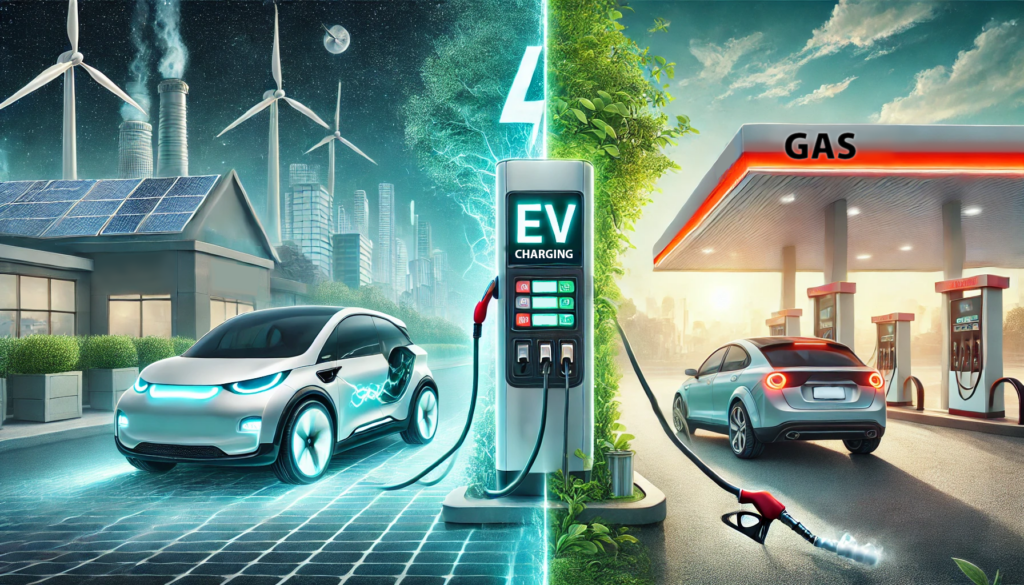Electric vehicles (EVs) are often touted as the future of transportation, offering a cleaner and more sustainable alternative to traditional gas-powered cars. But when it comes to the true cost of ownership, how do EVs compare to their gasoline counterparts? The answer isn’t as straightforward as it may seem. From purchase price and fuel costs to maintenance, incentives, and resale value, multiple factors play into the long-term expenses of owning each type of vehicle.
In this article, we break down the financial realities of EVs and gas-powered cars to help you understand which option is the better investment in the long run.
Initial Purchase Price: EVs vs. Gas Cars

One of the most significant factors influencing a buyer’s decision is the sticker price of the vehicle. Historically, EVs have been more expensive upfront than their gas-powered counterparts due to the high cost of battery production. However, this gap is closing as technology improves.
Electric Vehicles: Higher Upfront Cost, But Shrinking
The average price of a new EV in 2024 is around $50,000, though some models, like the Tesla Model 3 ($38,990) and Chevrolet Bolt EV ($26,500), offer more affordable options. Luxury EVs such as the Lucid Air ($77,400) and Porsche Taycan ($90,000+) sit at the higher end of the spectrum.
One of the primary reasons for the high price is the cost of lithium-ion batteries, which make up nearly 40% of an EV’s production cost. However, as battery technology advances and production scales up, EV prices are expected to drop further.
Gas-Powered Cars: Lower Base Price, More Variety
Gas-powered vehicles are still cheaper upfront, with the average new car price hovering around $47,000 in 2024. However, there are significantly more budget-friendly options available. For example:
- Honda Civic – Starts at $24,000
- Toyota Camry – Starts at $26,000
- Ford F-150 (Gas) – Starts at $36,000 (compared to the F-150 Lightning EV at $49,995)
While gas-powered cars have a pricing advantage initially, the financial picture shifts when considering long-term costs like fuel and maintenance.
Fuel and Energy Costs: The Real Cost of Powering Your Car

One of the biggest selling points of EVs is their lower fuel cost compared to gasoline. However, electricity prices vary significantly by state, and charging infrastructure plays a role in determining convenience and efficiency.
Electricity Costs: Cheaper, But Location Matters
Charging an EV at home can be significantly cheaper than refueling a gas car. The national average for electricity in the U.S. is about $0.16 per kWh.
- A Tesla Model 3 (RWD) has a 58 kWh battery and a 272-mile range, meaning a full charge costs around $9.28 and gives you nearly 4.8 miles per dollar.
- In contrast, gasoline-powered cars like the Toyota Camry (32 MPG) cost around $3.50 per gallon, providing only 9 miles per dollar.
Public fast-charging stations (like Tesla Superchargers) are more expensive, often costing $0.25-$0.50 per kWh, making long road trips pricier than home charging.
Gasoline Costs: Stable, But Can Fluctuate Wildly
Gasoline prices fluctuate based on geopolitical events, supply chains, and market conditions. As of 2024, the national average is around $3.50 per gallon, but in states like California, prices often exceed $5 per gallon.
- A typical gas car that gets 30 MPG would cost about $2,000 per year for a driver covering 15,000 miles annually.
- An EV owner driving the same distance and charging at home might spend only $600-$900 annually on electricity.
Over a 10-year span, EV owners could save $10,000 to $15,000 in fuel costs alone, making up for their higher initial purchase price.
Maintenance & Repairs: EVs Take the Lead

EVs have fewer moving parts than internal combustion engine (ICE) vehicles, reducing their overall maintenance costs. However, battery replacements can be a major expense if the pack fails outside of warranty.
EV Maintenance: Fewer Repairs, But Costly Batteries
EVs don’t require oil changes, spark plugs, or timing belts. Their regenerative braking systems also reduce brake wear, extending brake life significantly.
- Annual EV maintenance costs are $330 per year on average, compared to $792 for gas cars (according to AAA).
- However, replacing an EV battery outside of warranty can cost $5,000 to $15,000, though most modern EVs have 8-year/100,000-mile warranties covering battery replacements.
Gas Cars: More Frequent and Costly Upkeep
Traditional cars require oil changes ($50-$100 per visit, 3-4 times per year), transmission servicing, brake pad replacements, and more. Over time, these costs add up:
- Routine maintenance over 10 years can total $10,000-$15,000 for gas cars.
- Engine failures or major transmission repairs can run $3,000-$7,000, depending on the severity.
Resale Value & Depreciation: Which Holds Its Value Better?

One of the most overlooked costs of vehicle ownership is depreciation, which can significantly impact your long-term financial outlook.
EV Depreciation: A Mixed Bag
Historically, EVs have depreciated faster than gas cars due to concerns about battery longevity and the rapid evolution of EV technology. However, Tesla vehicles and certain high-demand models are holding their value better than ever.
- The Tesla Model 3 retains 64% of its value after 5 years, one of the best in the industry.
- Older Nissan Leafs have seen steep declines, with some 7-year-old models selling for as low as $8,000 due to outdated battery technology.
Gas Car Depreciation: More Predictable
Traditional gas vehicles depreciate at a consistent but sometimes slower rate.
- A typical new car loses 15-25% of its value in the first year and around 50% after five years.
- Trucks and SUVs (such as the Toyota Tacoma) tend to retain their value better than sedans.
For buyers concerned with resale value, newer EVs like Tesla, Rivian, and Lucid are proving to hold their worth more competitively than before.
The Bottom Line: Which is the Better Financial Choice?
The true cost of owning an electric vehicle versus a gas-powered car depends on your lifestyle, driving habits, and location.
- EVs have higher upfront costs, but lower fuel and maintenance expenses can make them cheaper long-term.
- Gas cars are more affordable initially, but fuel prices, maintenance, and depreciation can make them more expensive over time.
For those with access to home charging and EV tax incentives, an EV can be the smarter financial move. However, if you frequently take long road trips or lack charging access, a gas-powered car may still be the better option for now.
As EV technology advances and battery prices drop, we may soon see a tipping point where EVs become the undisputed financial winner across the board. Until then, the decision comes down to your personal budget, needs, and priorities.






